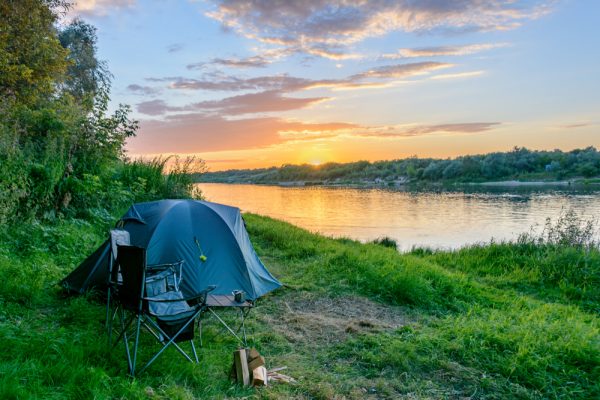Camping, Gear, Hunting, Sports Apparel
Five Tips for Staying Comfortable in the Great Outdoors

Five Tips for Staying Comfortable in the Great Outdoors
Many people associate outdoor activities such as hiking or camping with being uncomfortable, cold, or dirty. Nature can be breathtaking and great fun when you take the right approach. The trick to enjoying your time outside is learning how to maintain personal comfort in the elements. Nothing ruins an otherwise nice day like being freezing cold, wet, or hungry. Here are five tips that will help keep you comfortable and happy in the great outdoors.
1. Dress for the season, not for the weather. All too often, people head out for a hike on a seemingly sunny day, only to have the weather change without warning, especially in the Midwest. This can be especially true in mountainous areas. Bring enough clothing to allow for layering. Packing something a simple as a windbreaker and a warmer change of pants can make all the difference should the weather unexpectedly change. Being cold or windburned is never fun.
2. Stay dry. Staying warm and dry is essential to outdoor comfort. Wearing damp or wet clothing is uncomfortable and can lead to hypothermia in cold conditions. People get rained on, sweat, or fall into the water, so it’s a good idea to have a dry change of clothing. It’s best to avoid clothing made from natural fibers like cotton, as they’re slow to dry and lose most of their insulation when wet. Wool is one exception to this rule as it dries quickly and retains warmth when wet. Consider wearing clothing made from synthetic fibers like nylon, technical fibers such as gortex and primaloft, or wool products like those made from merino wool. These fibers wick moisture away from the body and can be quickly dried outdoors. They’ll also still work to keep you warm if they happen to get wet. While it’s not always practical to pack extra footwear on the trail, keeping fresh socks and a pair of dry shoes or sandals in the vehicle will be greatly appreciated after returning from a days trek.
3. Don’t let yourself become hungry or dehydrated. You typically burn a lot more calories outdoors than you do during our time at home or in the office. It’s not uncommon for your daily caloric requirements to double when hiking, biking, or swimming. Most seasoned outdoors people combat this by snacking on nutrient-dense foods throughout the day. Foods like nuts, candy, dried meats, fruit, cheese, and crackers are all relatively lightweight to carry and contain the carbs, protein, and fat you need to feel satisfied.
Even more important than food is water. Never allow yourself to become dehydrated. Bring ample water and drink often. Drinking bladders that fit inside your backpack work well for transporting necessary water. For extended outdoor trips where packing enough freshwater isn’t practical, you can use pump style water filters, disinfecting tablets, or UV light filters to purify lake and stream water for cooking and drinking. Remember that you should never drink untreated water regardless of how clean it appears.
4. Stay clean. It’s not always possible to remain sparkling fresh when outdoors. But that doesn’t mean your hygiene has to suffer when you don’t have access to running water. This is where baby wipes can save the day. Moist baby wipes are lightweight and don’t take up much space. They are perfect for cleaning the offending areas of the body without the need for running water.
5. Pack efficiently. Remember that everything you put in your backpack has some weight. It’s surprising how quickly even lightweight items will add. Think about what essentials are most likely to be required and leave the rest behind. A trick to lighten the load is to pack well beforehand and feel the weight of your gear. If it feels heavy, cut some non-essentials and repack. After a few times repacking, you’ll naturally thin out the things that you probably don’t need. Leave the luxuries at home and focus on the essentials.
The common thread here is maintaining personal comfort. These suggestions are small things that can make big differences as to how enjoyable your time outdoors will be. If you plan ahead to ensure you stay warm, dry, and fed, you’ll be surprised how long you can comfortably remain in nature. With a little bit of foresight, you can stay clean and comfortable during your next excursion.